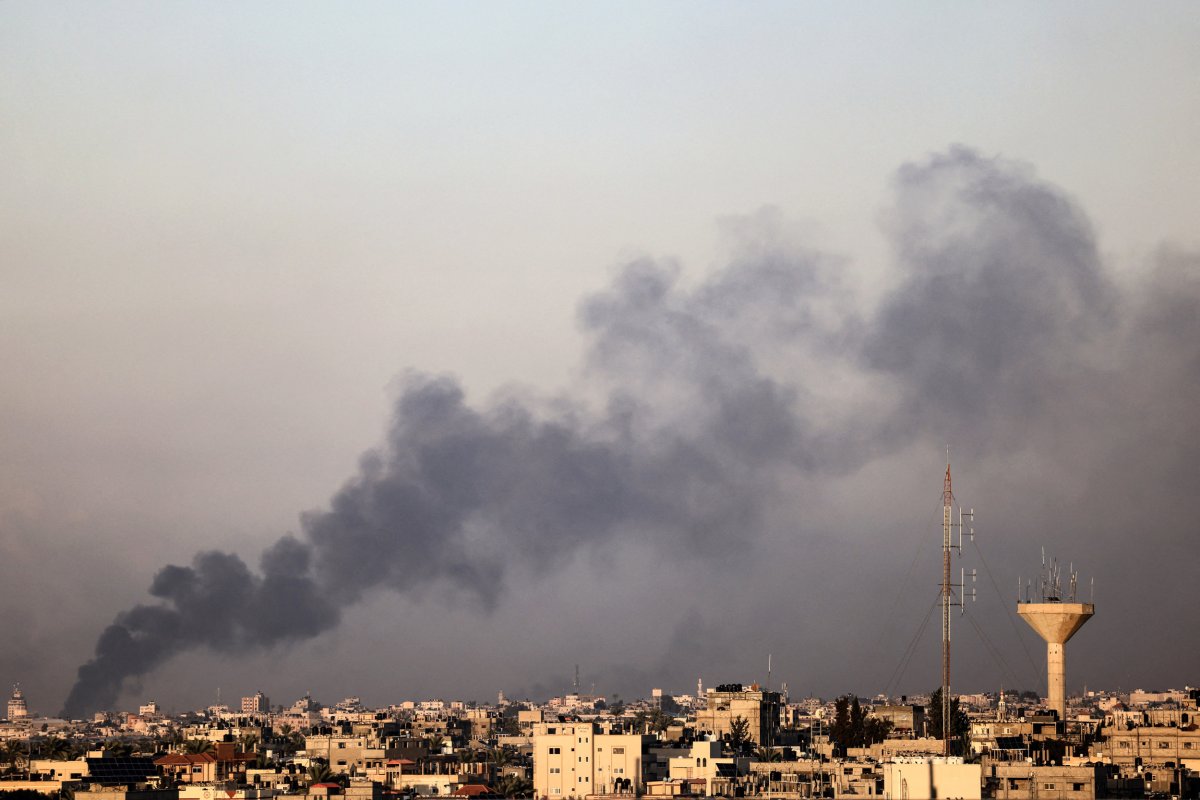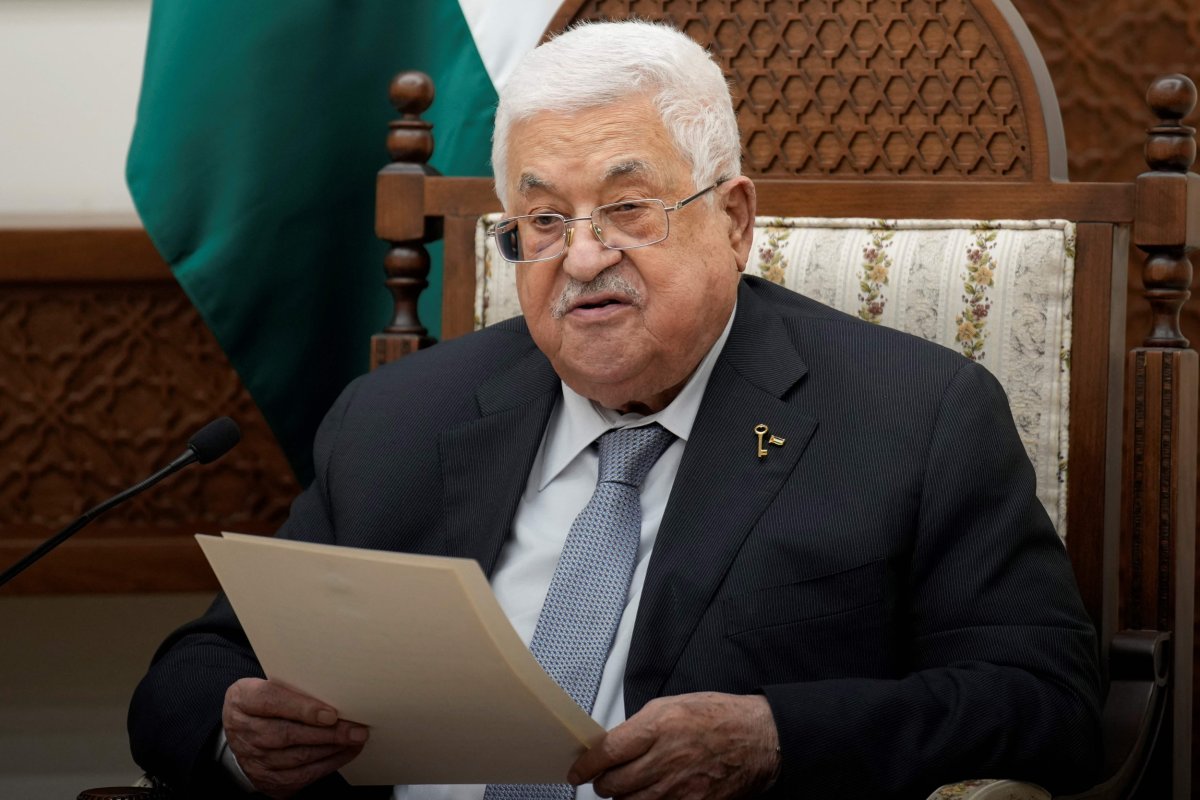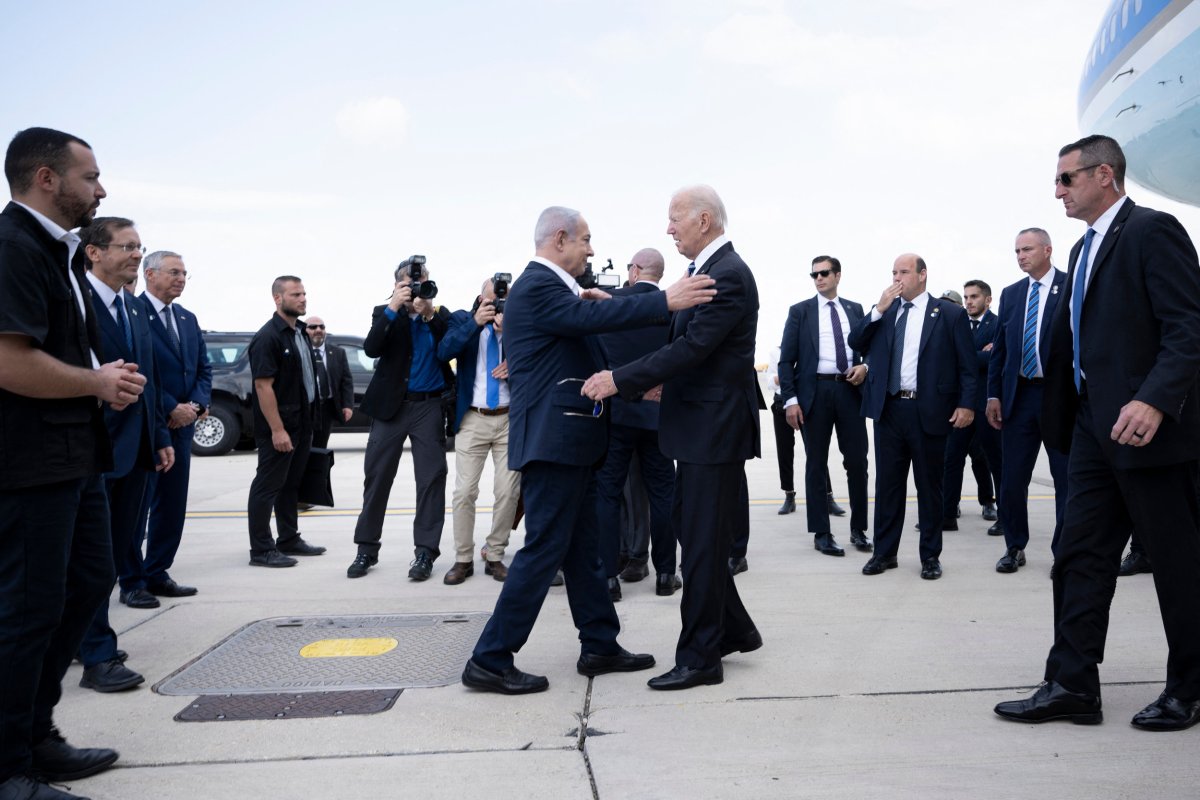Daniel Bush
The Palestinian Authority is prepared to take back full control of the Gaza Strip as soon as the war between Israel and Hamas is over and is willing to hold its first national elections since 2006 as part of a broader long-term peace deal, a senior Palestinian official told Newsweek.
The Palestinian Authority would accept the Biden administration's proposal for a reunification of Gaza and the West Bank under the authority's control if the international community supports the reconstruction of Gaza and pushes Israel to agree to a two-state solution, Ahmad Majdalani, a senior member of the Executive Committee of the Palestinian Liberation Organization, said Wednesday in an interview at a government office in Ramallah, the seat of the Palestinian administration in the Israeli occupied West Bank.
As part of the arrangement for taking full responsibility for Gaza, the Palestinian Authority would be willing to hold its first national election since the one in 2006 that swept Hamas into power in Gaza, said Majdalani, an ally of Palestinian Authority President Mahmoud Abbas.
"We're ready for a reform political agenda with a free, democratic general election," he said. But the Palestinian Authority won't come to the negotiating table if Israel won't let it decide Gaza's future, he added.
"We're not returning on an Israeli tank," Majdalani said. "It will be done with a political solution."
The Palestinian Authority could start governing Gaza once the current conflict is over, Majdalani said, and could hold an election following a "transitional period" of one to two years. Majdalani added that if Abbas, who is 88 years old, is still in office at that time it would be up to him and his political party to decide whether he should seek reelection.
The comments represent the first substantive response by the Palestinian Authority leadership to the White House vision for a post-conflict Gaza that Vice President Kamala Harris described in detail in a speech last Sunday.
But the position laid out by Majdalani also raises major areas of potential disagreement between the Palestinian Authority and Israel, an indication of the obstacles to the effort underway by the United States to start charting a political solution to the conflict.
Israeli Prime Minister Benjamin Netanyahu has not prioritized reaching a two-state solution that would create an independent, sovereign Palestinian state. The current government is widely seen as the most right-wing in Israel's history. It includes religious conservative leaders who are vocal backers of Israeli settlement expansion in the West Bank, which is illegal under international law and is criticized by the United States and other Western countries as a barrier to a viable Palestinian state.
Netanyahu said on Tuesday that after the war "Gaza must be demilitarized". But rather than discussing details for a post-war administration there, Israel has focused on its war to destroy Hamas, the militant group that controlled the Gaza Strip and used it to launch the Oct. 7 attack on Israel. Still, Israeli officials are following the conversation around Gaza's future that has been sparked by the Biden administration push in recent weeks to come up with a plan for the day after the fighting ends.
Israel Demands Security
Israel is unlikely to agree to any solution for Gaza that it does not see as meeting its security needs, said an Israeli official who asked not to be named to offer a frank assessment of the Biden administration's post-war Gaza strategy.
"The understanding now in the security establishment in Israel is that Gaza, like the West Bank, has to be demilitarized in order for us to be able to live side by side," the official said, adding that this applied to the Palestinian Authority or whatever entity eventually takes over in Gaza.
 A picture taken from Rafah in the southern Gaza Strip on December 6, 2023, shows smoke billowing during Israeli bombardment in Gaza.MAHMUD HAMS/AFP VIA GETTY IMAGES
A picture taken from Rafah in the southern Gaza Strip on December 6, 2023, shows smoke billowing during Israeli bombardment in Gaza.MAHMUD HAMS/AFP VIA GETTY IMAGESOnce Israel decides it has achieved its military objectives in Gaza, which includes the return of the more than 100 remaining hostages who are being held there, the process of demilitarizing Gaza won't happen overnight, a second Israeli official said.
"The assumption is there will still be terror hotspots" in Gaza after the current phase of the war ends that will require a continued Israeli security presence in the territory, said the official, who also spoke on the condition of anonymity to discuss the Israeli government's thinking. Israel will "need to maintain some level of operational freedom in Gaza," said the official, adding that Israel is not interested in a reoccupation of the Gaza Strip.
The Palestinian Authority would oppose any such interim arrangement in which it steps up its presence in Gaza while Israel maintains effective control of the territory, Majdalani said. He also said the authority would not support an international peacekeeping force after the war. The Palestinian Authority can handle security in Gaza if it receives logistics support from Egypt and Jordan, Majdalani said. He did not provide further details on what support the authority's security forces might need.
Beyond questions surrounding Gaza's future, a political solution to the Israeli-Palestinian conflict along the lines of the one being floated by the White House would also need to address broader regional issues, Middle East experts and former U.S. officials said.
The thorniest problem is dealing with Iran's support for groups like Hamas and the powerful Lebanese militia Hezbollah, said James Jeffrey, a U.S. ambassador to Iraq and Turkey under former President Barack Obama.
"Iran's malignant influence and actions to undercut a two-state solution and the Palestinian Authority need to be countered for there to be any realistic chance for the administration's approach to succeed," said Jeffrey.
Given all the challenges, administration officials are aware the proposed path to peace is a long shot, said one person familiar with the White House's planning who asked not to be named.
"The administration knows this may not be the solution. But there is no other possible solution," the person said.
The White House declined a Newsweek request for comment for this story.
 Palestinian President Mahmoud Abbas speaks during a meeting with the French president on October 24, 2023 in the West Bank city of Ramallah.CHRISTOPHE ENA/POOL/AFP VIA GETTY IMAGES
Palestinian President Mahmoud Abbas speaks during a meeting with the French president on October 24, 2023 in the West Bank city of Ramallah.CHRISTOPHE ENA/POOL/AFP VIA GETTY IMAGESTwo-state Solution
The Biden administration's post-war vision for a unified Gaza and West Bank under Palestinian Authority control was first announced by Secretary of State Antony Blinken, one month into the conflict.
Biden had already traveled to Israel and given an Oval Office address reiterating his support for a two-state solution. But Blinken's Nov. 8 remarks on Gaza's future represented a turning point in the administration's response to the war, as focus shifted from backing Israel's right to defend itself to putting more public pressure on Israel to limit the mounting civilian death toll in Gaza.
Since then senior administration officials have put growing emphasis on the so-called "day after" plan for Gaza, a sign the White House is searching for long-term political solutions even as the fighting continues.
After the collapse of a weeklong ceasefire, Israel is stepping up airstrikes and ground operations against Hamas in southern Gaza, in what humanitarian aid groups warn could be a catastrophic next phase of the war.
Nearly 16,000 people in Gaza have been killed by Israel since the start of the war, according to the Hamas-run Gaza Health Ministry. The Oct. 7 attack by Hamas killed 1,200 people in Israel and included the abduction of 240 others.
As the fighting intensified, Harris provided a point-by-point outline of the U.S. plan for Gaza in Dec. 3 remarks delivered on the sidelines of an international climate conference in Dubai.
Future stability in the region hinges on a "revitalized" Palestinian Authority that can govern Gaza and the West Bank, and take over security responsibility for the territories, Harris said.
"The Palestinian Authority must be revitalized, driven by the will of the Palestinian people," Harris said.
 Israel Prime Minister Benjamin Netanyahu greets U.S. President Joe Biden upon his arrival at Tel Aviv's Ben Gurion airport on October 18, 2023.BRENDAN SMIALOWSKI/AFP VIA GETTY IMAGES
Israel Prime Minister Benjamin Netanyahu greets U.S. President Joe Biden upon his arrival at Tel Aviv's Ben Gurion airport on October 18, 2023.BRENDAN SMIALOWSKI/AFP VIA GETTY IMAGESBut the Palestinian Authority's popularity has declined among many Palestinians living in Gaza and the West Bank in the years since Israel withdrew its troops and settlements from the Gaza Strip in 2005.
Some opinion surveys show public support for the Palestinian Authority has declined since its political party lost the 2006 election to Hamas that paved the way for Hamas to seize control of Gaza. The group's election victory sparked a violent clash between the two factions, leaving Hamas entrenched in Gaza and the Palestinian Authority in control of a portion of the occupied West Bank.
The authority is viewed by many Palestinians as a corrupt, highly ineffective governing body that cooperates with Israel in suppressing Palestinians in the West Bank, said Mohammed M. Hafez, a professor at the Naval Postgraduate School.
"The Palestinian Authority does not have the legitimacy it once had," said Hafez, an expert on Islamic political violence and Middle East politics. "To ask it to rule over Gaza without political legitimacy is a recipe for disaster."
Majdalani, the senior Palestinian official, denied that there was widespread corruption problem inside the Palestinian Authority, and noted that Netanyahu is facing corruption charges of his own.
He also warned Netanyahu that it would be a mistake for Israel to think it can resume effective control of Gaza after the war, even for an interim period.
"If Netanyahu wants to occupy Gaza another time, it won't be accepted," he said, "not only by the Palestinians but by other Arab countries and the rest of the world, including the U.S."
No comments:
Post a Comment